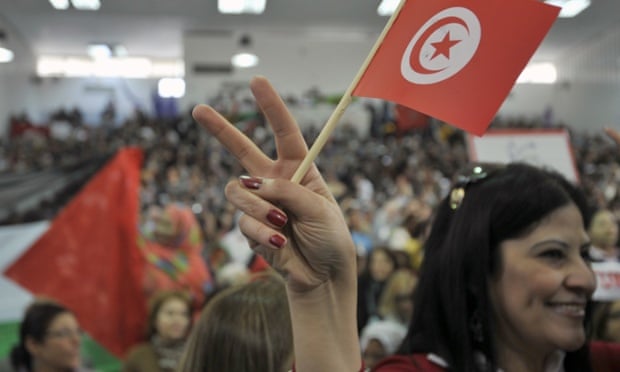For the second time in a row, the World Social Forum will gather in Tunisia, the birthplace of the Arab spring. The courage it took to stand up to regimes that were so secure in their isolation from the people continues to inspire, despite the powerful backlash in some places. We know we’re challenging the most powerful interests in the world, but we also know that the persistence of those dedicated to openness and democracy can create permanent change. Following the appalling attacks in Tunis last week, we have seen the courage of ordinary people once again taking to the streets to denounce violence, insist on human rights, and continue to demand a better world of justice, freedom and peaceful coexistence.
 A woman waves the Tunisian flag at the opening of the 2013 World Social Forum in Tunis. The civil society gathering returns to the Tunisian capital this year. Photograph: Fethi Belaid/AFP/Getty Images |
In the past couple of years, international civil society organisations like ActionAid, and our counterparts at national and local levels, have seen the spaces we use to defend human rights, economic justice, and democratic process come under sustained attack in country after country. Just last month, in the Democratic Republic of the Congo, activists reacting to a brazen move to indefinitely postpone presidential elections were confronted with a government willing to shut down the entire country’s internet and phone services to prevent groups from organising. In a growing number of countries, such manoeuvres have been institutionalised as full-time bans on social media outlets.
But they can’t stop people from learning about successful global movements, nor about the critiques of the status quo that point to alternative economic and social futures. Whatever the restrictions, people are braving them – as well as braving, too often, violent responses – to demand more enlightened policies. In Africa, many countries are constantly imposing new restrictions on what civil society groups can do and say, and using extrajudicial intimidation and infiltration to hobble any efforts to hold authorities accountable. And it happens in rich countries, too: infiltration and surveillance against groups – most of them far from revolutionary – supporting justice and human rights are widespread. The Canadian government last year said that aid groups can relieve poverty, but violate their charters if they talk about preventing poverty.
The resolve of people pushed too far, and the democratisation of communications, has put the people on a collision course with those benefiting from the illicit hoarding of wealth and power. A web of obscure laws and complex financial connections, maintained by armies of accountants and attorneys, has wound its grip around those not among the favoured few. The siphoning of money away from people and governments and into the pockets of super-wealthy corporations and individuals has reached proportions that few of us can fathom. The system, in the shape of its most successful exploiters, is consuming itself while marshalling its forces to silence those who sound the alarm.
That’s why, as the World Social Forum begins, ActionAid has issued a joint call with the Association for Women’s Rights in Development, Greenpeace, Civicus and Oxfam to tackle the damaging power of the 1%. That’s why, at this year’s meeting, there is a stronger sense than ever that what once were viewed as different causes are now seen by frontline activists as one common cause. Global efforts to end poverty and marginalisation, advance women’s rights, defend the environment, protect human rights, and promote fair and dignified employment are all being undermined as a consequence of the concentration of wealth and power in the hands of a few. The clampdown on civil society is precisely because it represents a challenge to the nexus of money and power.
Activists at the World Social Forum are clear that the different issues that have brought us into activism – tax dodging or land grabbing, social justice or climate justice, economic rights or civil rights – are all part of a common struggle for a world in which everyone matters and in which the power of ordinary people can challenge the people with power. That’s why the World Social Forum is so urgent, so necessary.
A great example of the many inspirational organisations attending the World Social Forum is Fe-Male, a group that brings women and men together around the issue of women’s human rights, and which started the first feminist radio programme broadcast live in Lebanon, Sharika wa Laken. They are joined by groups from South Asia pressing for the rights of oppressed castes, and by Latin American movements for the rights of indigenous people. Coming together provides opportunities to gain strength from the success, struggles and solidarity of others.
In Tunis we are coming together to share, to learn, and to strategise. Repression normally happens at the national or local level, but when it does, we must become an international force that rallies people from every part of the globe to stand up. Our political space is valuable real estate; at the World Social Forum we’ll be deciding how we can protect it.
If we don’t stop the global power grab now, we may not get another chance.




Liked this article? Share it!